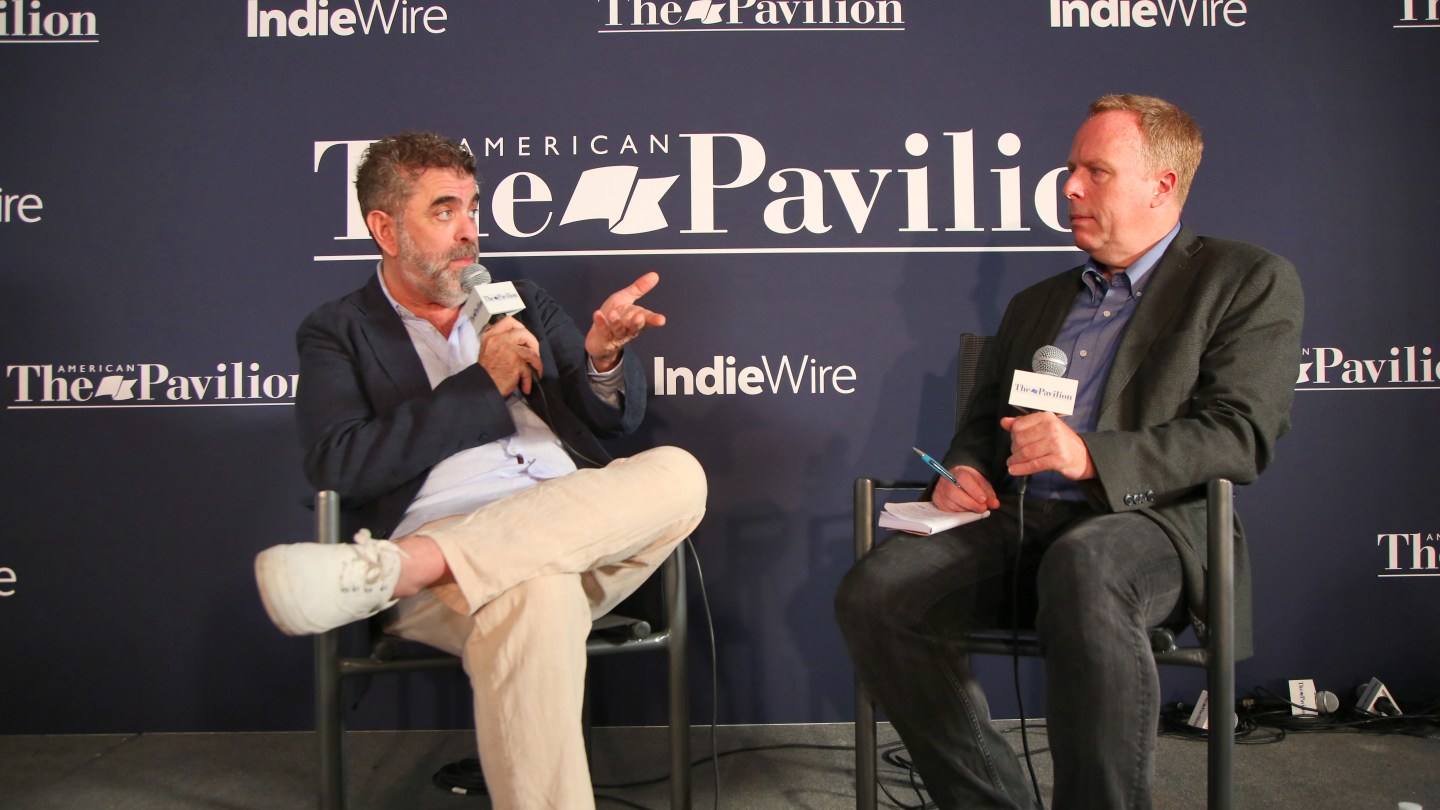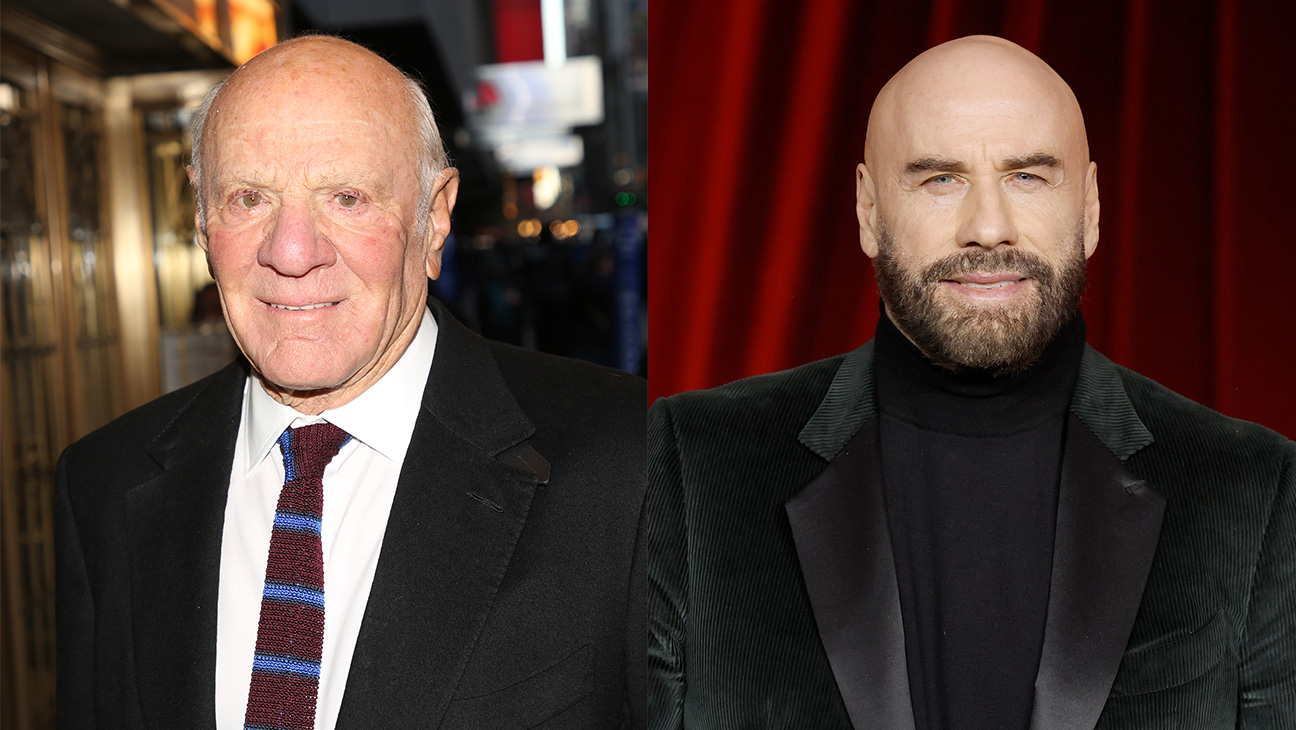
When Dennis Prager enters the small conference room at his radio station in Los Angeles, he seems to fill up the entire space.
He’s 6-foot-4 and has a deep, commanding voice that has gained him millions of listeners, even as it retains a slight, old-world Brooklyn accent. It’s early fall, and he’s wearing a blue striped shirt, a blue tie and dark slacks. He chooses to sit at the head of the table, in front of a glass display case containing awards. This would end up being one of his last interviews before an injury would leave him hospitalized for months, just as his media empire has become more influential than ever and ready to shape the minds of a new generation of potential Republican voters.
Prager, 76, has just finished taping an episode of the nationally syndicated Dennis Prager Show, which reportedly has more than 2 million listeners. (This day’s episode covered the killing of Hezbollah’s Hassan Nasrallah and Minnesota’s ethnic studies standard under Gov. Tim Walz.) The show is part of Salem Media Group, which owns 95 radio stations and broadcasts Christian and conservative content. Prager has been with Salem since about 2000, after having started on KABC in Los Angeles in the 1980s. The show’s tagline: “When Dennis Prager speaks, America listens.”
Prager seems full of contradictions. He’s a Jewish person in Christian radio, a conservative in progressive California, a New Yorker on the West Coast and a person who seems surprisingly cheerful despite his outrage on-air. In a typical episode, he rails against topics like legacy media, campus protesters and, of course, Democrats. But off-air, he’s happy to talk about classical music and his fountain pen collection. “I don’t collect old ones, I only buy new ones,” he says, lighting up. He removes two from a pocket and places them on the conference table. “This one is made in Japan, and this one is made in Germany. Our two enemies in World War II make the best stuff.”
Though Prager is widely known for radio, younger conservatives and the conservative-curious might instead know him as the co-founder of PragerU. Originally called Prager University, the tax-exempt media organization specializes in five-minute videos promoting “Judeo-Christian values,” as fundraising materials put it. Its clips have amassed nearly 10 billion views, according to the organization. Key to that success have been high-profile video hosts, aggressive marketing and enlisting Hollywood production talent who, according to PragerU’s leadership, are fed up with the industry’s wokeness.
PragerU has long been controversial, drawing reprimands over the years from the Southern Poverty Law Center, GLAAD, the Council on American-Islamic Relations and the Human Rights Campaign. Some critics, like Kansas State University researcher Adrienne McCarthy, argue that the organization serves as a gateway to far-right extremism through the values it promotes. Yet the organization has only continued to grow, most recently through kids content becoming available to public schoolers in a rapidly growing list of red states.
In PragerU’s view, the kids content teaches patriotism and other values that the left has ignored while obsessing over DEI and gender identity. The organization also believes that parents share its concerns about the state of America’s classrooms. “There’s an appetite for what we’re doing,” says Marissa Streit, PragerU’s chief executive officer. “There is a great awakening for parents and grandparents, where they’re realizing that their children are robbed of proper education.”
But to opponents, the videos are offensive in how they present everything from slavery to climate change to Black Lives Matter. Beth Lewis of Save Our Schools Arizona argues that teaming up with states gives PragerU a “veneer of accreditation and credibility” when it is really “a well-funded, billionaire-backed scheme that sells dangerous disinformation to our students who might not have tools to discern fact from fiction.” (PragerU’s donors have included groups tied to the Wilks brothers, who are fracking billionaires, for example.) And she mentioned one video in particular, about Christopher Columbus, that seems to be “saying slavery is no big deal.” PragerU has responded to such claims on its website, saying, “PragerU never minimizes the evils of slavery. Our critics choose to either ignore or lie about PragerU’s condemnation of slavery as an awful part of American history in these cartoons and many other pieces of content.”
Now that Republicans control the White House, Congress and the majority of state legislatures and public education is in their crosshairs, PragerU seems ready to expand its influence even further. It fits comfortably in this current conservative movement to address what’s taught in classrooms through legislation, parents’ rights groups and, most recently, moving to shutter the U.S. Department of Education. PragerU isn’t backing down. “They call us all kinds of names,” Streit says. “It’s so mind-boggling to me.”

PragerU founder Dennis Prager (center) is shown recording his radio show in 2008.
Digital Focus/Alamy Stock Photo
***
PragerU content is a lot about doom and gloom, like the urgent need to save Western civilization due to drag queen story hours and illegal immigration. But the mood at the organization’s headquarters is lighter. During a recent visit to the offices in Los Angeles —”the belly of the beast,” Streit likes to say — the CEO is wearing a pink blazer with a white top and blue jeans. Her office is bright and spacious, with light hardwood floors, velvety chairs and a conference table. There’s also a massive closet, a full-length mirror and a desk with a camera setup near it. A critic once referred to Streit as “white Christian nationalist Barbie,” a remark Streit reposted on Instagram, pointing out to her followers (she now has more than 100,000, and PragerU has more than 2 million) that she is Jewish and her mother is from Morocco.
PragerU has Hollywood roots. The idea came from Allen Estrin, Dennis Prager’s radio producer and a screenwriter who has taught at the American Film Institute. The men were on an Indian Ocean cruise around 2009 with listeners of Prager’s show when two friends approached Estrin about starting a Prager University, suggesting they “do something along the lines of Hillsdale,” Estrin recalled in a 2019 “Fireside Chat” PragerU video. (Hillsdale is a Christian college in Michigan that forgoes federal funding to avoid anti-discrimination regulations.)
Estrin crunched the numbers and decided it would take too much time and effort. But he liked the idea of doing something educational, so he pitched Prager during the cruise: “Let’s create something on the internet.” Estrin and Prager soon got to work shooting five-minute internet videos, a form then still in its early days. (YouTube launched in 2005.)
Making videos wasn’t entirely new to them. In 1993, the duo had made a 29-minute comedy short, For Goodness Sake, made up of vignettes focusing on virtue. Airplane!‘s David Zucker directed, and the cast included Jason Alexander, Bonnie Hunt, Florence Henderson, Bob Saget, Cindy Williams and Eugene Levy. Zucker also put up money for the project, which they intended to be a series pilot. It eventually aired on Los Angeles public television and was sold as a training video for corporations and schools. (For a 1996 sequel, they enlisted Trey Parker as director and Matt Stone as first assistant director, a year before the debut of South Park.)
Even as they focused on videos, the name “Prager University” stuck. An early version of the website listed video titles as if a course catalog: economics, history, philosophy, political science and religion. The site had an option to “enroll” and a “faculty” section. Some states require that an entity be formally approved as a university to call itself one (recall the scrutiny Trump University faced). By 2014, a disclaimer on the site noted it wasn’t actually “an accredited academic institution,” though it remained a nonprofit.
In 2011, Prager and Estrin brought on Streit, whom they met through a family she had once tutored in Hebrew. The team still felt Prager University wasn’t reaching enough viewers. “We were violating a basic Hollywood rule,” Estrin said in a 2021 documentary shot by The Daily Wire. “You need to spend as much on marketing as you do on production.” So they revamped the website. In 2015, they rebranded as PragerU and began thinking of themselves as not just an educational entity but also a media company. Videos became more clicky and provocative, with titles like Why I Left Greenpeace and What They Haven’t Told You About Climate Change. They brought in younger talent, too, including Charlie Kirk, the founder of conservative student group Turning Point USA.

PragerU CEO Marissa Streit with founder Dennis Prager at their Los Angeles offices. “There is a great awakening for parents, where they’re realizing that their children are robbed of proper education,” says Streit.
Courtesy of PragerU
The rebrand worked. A 2015 video, on the virtues of the electoral college (which at that time greatly favored Republicans), went viral, eventually earning more than 66 million views. Themes started to emerge in PragerU content: Police and capitalism were good, socialism and political correctness bad, the effects of climate change were debatable, and gender dysphoria went against biology.
Around the time of the 2016 election, PragerU was far from the only expanding right-wing media company, even in Los Angeles, where the Breitbart News Network (then run by Steve Bannon) and Ben Shapiro’s The Daily Wire also were based. But while other sites focused on the MAGA talking points du jour (think Hillary Clinton’s emails), PragerU didn’t hitch its wagon to Trump, barely mentioning him during his first administration. For one, as a 501c3, PragerU legally must stay away from political activity. And Prager himself had in 2011 called Trump “unfit to be a presidential candidate, let alone president,” though he subsequently wrote in 2016 that voting for Trump over Clinton was “political chemotherapy needed to prevent our demise.”
Anthony Curtis, who worked there as director of major gifts in 2020 and 2021, explains the leadership’s thinking as, “Listen guys, we’re not here to engage in the daily controversy. … We have to maintain our credibility.”

PragerU’s online conservative video offerings include What They Haven’t Told You About Climate Change.
Screenshot/YouTube
Still, plenty of political pundits and Trump backers appeared in PragerU videos. These “presenters” included Kirk, Shapiro, Candace Owens and Tucker Carlson. Supreme Court Justice Clarence Thomas did a video on courage. Nikki Haley and Vivek Ramaswamy appeared in multiple videos, as did Pete Hegseth, now the secretary of defense, and Tulsi Gabbard, now the director of national intelligence. From the entertainment world, the list includes the usual who’s who of Hollywood’s small contingent of outspoken right-wingers, like Zucker, Kirk Cameron, Samaire Armstrong and Kevin Sorbo. Rob Schneider sat for an interview about “how comedy can help save the West.” Adam Carolla and Drew Pinsky made appearances, too.
Such personalities are crucial to PragerU’s success, says John Knefel of Media Matters for America, a left-leaning watchdog group. In PragerU clips, the personalities are not as “overtly frothing” as they might be on their own platforms, he says. “What is being presented is right-wing propaganda that has this veneer of ideological neutrality, but in fact it’s acting as a gateway to enter into these other MAGA fever swamps.”
Funding for these star-studded videos came from groups associated with wealthy Republican megadonors, including Dan and Farris Wilks, Sheldon Adelson, Lee Roy Mitchell, Bernard Marcus and Betsy DeVos. PragerU’s most recent publicly available tax filing, for fiscal year 2023, listed more than $68 million in revenue, double the amount from just three years earlier. PragerU hit a billion video views in 2017. It took less than four more years to get to 5 billion, in 2021.
PragerU decided it was time to expand its audience.
***
Streit was born in Los Angeles and moved to Israel when she was young. She served in the Israel Defense Forces and later was director of operations at the Israeli-American Council, a nonprofit that supports Israeli Americans. She says she also taught at and ran a private Jewish K-8 school and has a master’s in education. She initially worked for PragerU out of her kitchen. Now the operation consists of about 150 people across two floors in L.A., with offices for marketing and social media and six production studios that turn out upward of 40 pieces of new content each week. Wherever you look, there are American flags and depictions of Abraham Lincoln, Dennis Prager and the Founding Fathers. PragerU also has a smaller office in Florida.
The Los Angeles home base has enabled PragerU to recruit from the entertainment industry, which could be why its sleek videos look more Netflix than Cato Institute. “We get to hire the people that Hollywood repulses,” Streit says. “If you’re a white male in Hollywood, you are actually told that you should shut up and not talk until everybody else that wins victim bingo speaks ahead of you.” PragerU attracts “people who can’t leave California but don’t want to be beaten up like that every single day at work,” she says. That’s not to say the organization is only white men, she adds. “There are a lot of people of color who don’t want to be in those environments.” PragerU host Xaviaer DuRousseau, whom The New York Times recently profiled as a “conservative star,” and Amala Ekpunobi, who left PragerU in 2023, are Black.
Armed with production talent, and seed funding from venture capitalist David Blumberg, whom Business Insider once profiled under the headline, “He’s gay, believes in God, and voted for Donald Trump,” PragerU Kids launched in 2021. There are now about a dozen shows for three age categories. Otto’s Tales, for kindergartners through second graders, is a storytime show in which host Jill Simonian reads books about “American monuments, holidays and community helpers” over an animated version of the story. Unboxed, USA, for third- to fifth-graders, teaches about state history by having kids open boxes and guess the state based on what’s inside. For sixth grade and up, How To purports to teach life skills, like managing money. PragerU’s critics argue that even such seemingly nonpartisan content has a conservative bent. Media Matters has argued that the financial literacy series “Cash Course” mocks taking on student debt to attend a “big-deal drama school,” which it links to Republican attacks on higher education.
PragerU had long tried to connect with educators, but now the country had changed. A 2022 Pew Research Center survey found that the majority of Republicans said K-12 schools were having a negative effect on the country, while the majority of Democrats said the opposite. In spring 2023, New York magazine counted 71 Republican school bills in 28 states. “One of the things that unifies all these things is … a very powerful narrative that public schools in America have been taken over by some sort of radical leftist ideology,” says Adam Laats, a professor of education and history at Binghamton University. “The facts of the matter are, that’s just not true.”
So when PragerU started courting state education officials for partnerships, those officials likely saw it as a win-win. “It’s low-hanging fruit for an ambitious superintendent in a conservative area to say, ‘Hey, look, we have put this on the approved list,’ ” Laats says. “It might look like it has a big impact, even if it has a not measurable and probably not very significant impact.” The shows were already available for free on PragerU’s website. But to PragerU, state approval meant teachers could not be punished for using the content, and it could make it easier for teachers to access the resources through official education portals that they used for things like lesson planning and grading.
The first state to announce a deal was Florida, then at the center of the curriculum culture wars due to its 2022 “Don’t Say Gay” law and the May 2023 expansion of that law. “Drumroll … PragerU Kids is now an approved curriculum in Florida schools,” PragerU’s Simonian said in a live broadcast in July 2023.
Next came Oklahoma, followed quickly by New Hampshire, which brought PragerU Kids to a new level by enabling students who took the organization’s financial literacy module to get school credit through an existing state program called Learn Everywhere. New Hampshire’s education commissioner, Frank Edelblut, tells THR he’s aware of the opposition. “If the students are learning, we don’t care where they learn, we just care that they learn,” he says. More states followed: Idaho, South Carolina, Louisiana, Arizona, Montana and Texas. Oklahoma Superintendent of Public Instruction Ryan Walters said in that state’s announcement that he had used PragerU materials as a history teacher. “You’re actually telling history the way it was,” Walters said. “The left for so long has controlled the narrative.”
The scope of the partnerships varies. New Hampshire makes credit available, while Arizona links PragerU content on the state education website. The Texas arrangement is less clear. PragerU announced it was “now in Texas” and “on the approved vendor list.” (A Texas Education Agency spokesperson said in a statement, “Prager U has not been approved by either the Texas State Board of Education (SBOE) or the Texas Education Agency (TEA) as an instructional materials provider.”)
Tom Horne, the Arizona superintendent and a Republican former state attorney general, tells THR he encountered some opposition even in his family. “My youngest daughter’s very liberal,” he says. “She wrote me, ‘How can you put up Prager videos? They’re for slavery.’ So, I sent her about 10 of their videos that were historical videos, completely objective, there was no ideology in them at all, and I never heard another complaint from her.” While teachers don’t have to use the videos, he says, “I would certainly encourage it.”
***

PragerU has amassed a huge audience by tapping right-wing stars and politicos — including (from left) Tucker Carlson, Tulsi Gabbard, Pete Hegseth, Vivek Ramaswamy and Clarence Thomas — as hosts for content that is deeply conservative but not overtly Republican.
Chip Somodevilla/Getty Images; ANDREW CABALLERO-REYNOLDS/AFP/Getty Images; Kevin Dietsch/Getty Images; Andrew Harnik/Getty Images; Andrew Harnik/Getty Images
A politically left-leaning high school teacher in deep-red South Carolina, Clifford Lee, learned about the PragerU partnership from the South Carolina Education Association, where he has been a board member. He wrote to the superintendent and his state legislators to voice opposition. He believes the material can’t be trusted and that content should teach students to think, not do the thinking for them. “They hijack my legitimacy, they hijack my relationships that I’ve had with my students,” he says. He never heard back from the legislators or the superintendent, he says, so he took it upon himself to urge co-workers not to use the videos. “The stakes are too high to let this go unchallenged,” he says.
Lee isn’t the only one pushing back. Americans United for Separation of Church and State launched a probe into the Florida and Oklahoma partnerships. In New Hampshire, Cinde Warmington, who was on the state’s executive council and ran unsuccessfully in 2024 in the Democratic primary for governor, asked the state attorney general to look into whether PragerU broke the law by calling itself a “university.” (The AG said it did not.) In Louisiana, lawmakers introduced a resolution urging the state to bar “edu-tainment children’s videos that are discriminatory and anti-Semitic,” citing PragerU. The proposed resolution died.
Opponents argue that rather than teach facts, PragerU videos illustrate already-drawn conclusions to spread a problematic agenda. “It’s simply propaganda,” says Kevin Kruse, a Princeton professor of history and director of undergraduate studies. “PragerU starts with certain conclusions it has and works backward through history to try to cherry-pick evidence that supports this,” he says. “It’s bad-faith motivation, doing bad history, to draw bad conclusions.”
Knefel of Media Matters and colleagues watched every PragerU Kids video and released a September 2023 report. Some of the clips they found most troubling came from the animated show Leo & Layla’s History Adventures, for elementary schoolers, in which siblings time-travel to meet historical figures. In one they highlighted, a cartoon Booker T. Washington says slavery has “been a reality everywhere in the world” but that “America was one of the first places on Earth to outlaw slavery” and “future generations are never responsible for the sins of the past.”

Leo & Layla’s History Adventures, aimed at schoolchildren.
Screenshot/YouTube
In another clip they found concerning, an animated Christopher Columbus says the place he discovered “wasn’t exactly a paradise of civilization, and the Native people were far from peaceful.” This Columbus adds some tribes were “vicious, warring cannibals,” that “being taken as a slave is better than being killed, no?” and that, while he’s glad the perspective has changed in the future, to “judge me by your standards from the 21st century” is “estupido.”
The extent to which teachers are actually using the material is unclear. When a Fox affiliate in Oklahoma City reached out to school districts in the state, they generally responded that they were not. In New Hampshire, an education department spokesperson told THR that 19 students have completed PragerU’s financial literacy course and received certificates, and 43 were enrolled. The state has about 54,000 public school high school students.
Streit says she doesn’t have numbers on how many teachers are using the content, and that as “a freedom junkie,” she doesn’t want to be “hovering over” people. “I don’t think Scholastic tracks every parent and teacher that uses their product, but does that mean that Scholastic is not in the classrooms?”
***
On a Tuesday morning in November, exactly a week after the presidential election and a couple of weeks after speaking with THR, Dennis Prager fell at his home and was rushed to the hospital. Doctors determined he had injured his spinal cord, impairing his breathing. The Cedars-Sinai intensive care unit placed him on a ventilator. It was possible he would never walk again, just as PragerU’s influence seemed bigger than ever.
For months, PragerU has released health updates, including one in February to say that Prager was talking and eating but couldn’t move from the shoulders down. In a March video update, his son David Prager, the organization’s chief development officer, shared a voice recording from his father that said, “I intend to go back on the radio.” Soon after, Salem announced he would be back on-air in June, though the company said it had given his old time slot to Charlie Kirk, the past PragerU presenter who has become a leading MAGA-world personality. Then there was a setback. In May, PragerU said Prager had made it home but caught pneumonia and returned to the hospital. “That was a serious step back,” Estrin said in an update while adding that Prager was again on the path to recovery. Salem delayed his return date and has not given a new one.
If Prager returns, he’ll do so in an environment that looks different from the one he left in November, one that’s arguably more favorable to his cause, but also more crowded than ever. His son said in the March health update that it was not time for complacency. “People think we’re entering this golden age of conservatism,” he said. “If you don’t keep fighting when it’s the golden ages, it will come back to the dark ages.”
This story appeared in the May 21 issue of The Hollywood Reporter magazine. Click here to subscribe.
#Controversy #Curriculum #Conservative #Media





